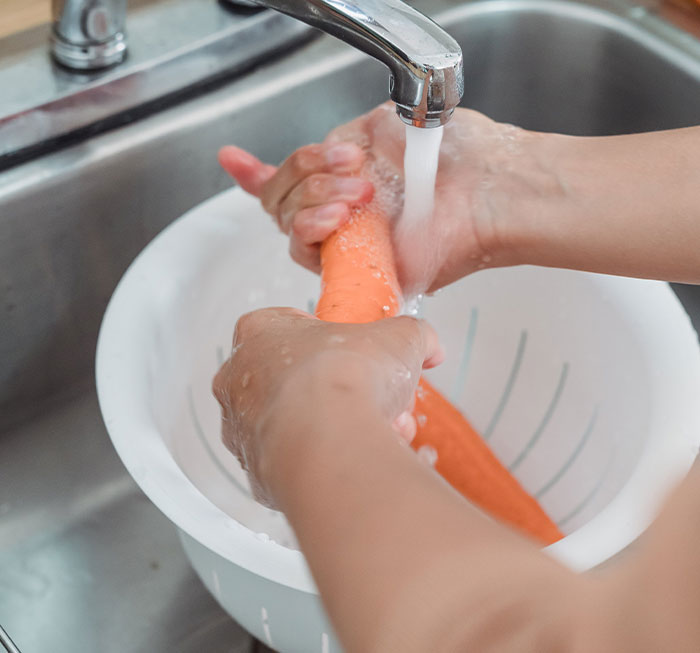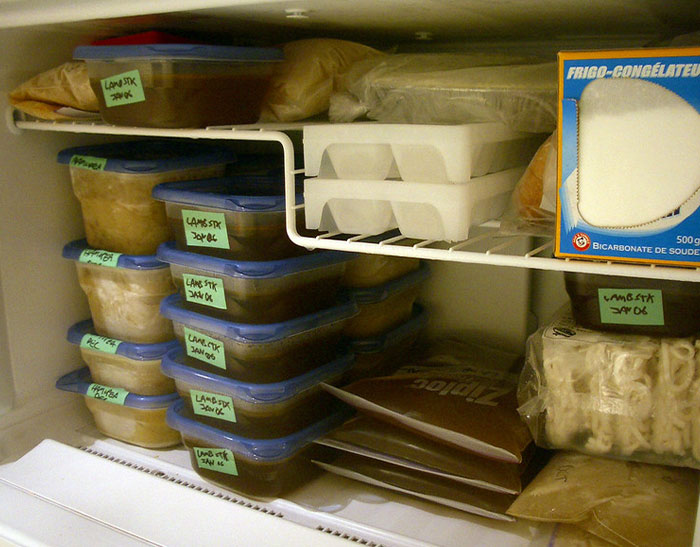These past few years have hit many people’s wallets in a very noticeable way. Rising product costs and shrinkflation mean that you’re sometimes left standing completely dumbfounded at the grocery store checkout counter. You only bought a handful of things. How come they cost so much?!
In a viral online thread, some personal finance-savvy and frugal-minded redditors shared their top tips on getting your grocery budget to go further. We’ve collected some of their best pieces of advice to share with you. You’ll find them as you read on.
We wanted to get to grips with saving more money at the grocery store, so we got in touch with Rick Orford, a well-known personal finance expert and the author of the bestseller, ‘The Financially Independent Millennial.’ Read on for the advice he shared with Bored Panda.
#1
Our local food bank has been extremely helpful when our budget has been tight.
They not only provide food but they have diapers and pull ups for my kids as well as free menstrual products and a large selection of books for both kids and adults.
At our food bank we are provided with a cart and allowed to go “shopping”; fresh fruits and vegetables are always available as are eggs, breads, rolls, biscuits, milk, some type of meat (ground beef, chicken, etc), frozen foods (usually frozen pizzas or different types of fish) and then random stuff in a cooler that you can pick items out of, as well as baked goods (pies, donuts, cookies, cakes, etc).
This week, they had bouquets of flowers they were giving out to each family; it may sound silly, but being able to brighten my kitchen up with flowers that I normally wouldn’t have been able to purchase has been very mood boosting.

Image source: soberdragonfly, Kampus Production/pexels
#2
There are lots of other great tips in this thread and similar threads, but honestly, the best way to cut down on grocery cost is to plan your meals (planning to eliminate all waste– if you don’t use all broccoli in one meal, plan another meal with broccoli), create a shopping list, and stick with the list. Most people with huge grocery bills are impulse shoppers without a plan and have high waste for perishables.

Image source: omgitsviva, Kampus Production/pexels
#3
I’ve found just buying store brand/generic is usually cheaper than even using a coupon.

Image source: ConsciousInflation23, Clean Wal-Mart/flickr
#4
I have been able to keep my grocery costs down by only buying what is on sale in the weekly ad or for which there is a digital coupon available. This is especially handy for produce—this week there were great deals on oranges and apples but not grapes, so that’s what I bought. I can’t always get what I *want* each week, but if I am patient then it will eventually go on sale.
I also make a lot of stuff from scratch like breads and pizza and cookies, which saves a ton of money.

Image source: pepmin, Paul Swansen/flickr
#5
A great tip is to ONLY allow yourself to shop once a week. This forces you to plan, forces you to make and eat what you planned, and plus if you run out well… just make something out of what you’ve got. There is always something there. Finally… we stopped drinking. That helps a LOT. 2 adults, 1 kid, $600/mo average, HCOL area.

Image source: ShanimalTheAnimal, Jack Sparrow/pexels
#6
1. Buy a whole purple cabbage. Goes in everything and lasts for months. 2. Wrap veggies in paper towel and put in a dry and clean plastic bag. First removing any ties and dead/old bits. No part of the veg should touch the plastic.

Image source: cyreneok, RDNE Stock project/pexels
#7
“Breakfast for dinner” is a thing in my house. Pancakes and hash browns fill you up pretty well.
Image source: supergalactic
#8
We pay $1000 a month for family of seven.
It does help that when school is in session, my kids’ schools provide lunches on school days. Occasionally my kids pack their lunches.
Generally, I do the following:
I meal plan every week. I cook from scratch almost every night. I online shop at Walmart to save time. I do not buy premade anything. Vegetables and fruits are fresh or frozen. No desserts premade. No smoothie mixes, no chips, no sodas, no prepackaged snack foods. Very rarely do I buy sandwich meat.
I refuse to buy name brand. I compare price per ounce on everything (easy to do on Walmart’s website). I don’t buy the expensive cuts of meat. We eat a lot of meatless dishes. We eat leftovers. We eat breakfast for supper.
From time to time when I’m motivated, I meal prep a couple meals over the weekend to save time. Sometimes I make a double batch and freeze half (tonight we’re having lentil chili from the freezer that I made three weeks ago).
Once the week’s money is spent, it’s spent, and we make do with what we have.

Image source: so_bold_of_you, Kampus Production/pexels
#9
Be mindful of waste.
Use your freezer. One or two portions left of that dinner from 2 nights ago? Freeze it. Easy, free dinner when you don’t feel like cooking. Look up how to make things stay fresh. Herbs and vegetables are things you should never throw out! Celery and carrots for example, I almost never use up the 1lb bags they come in. Properly washing, trimming, and storing in water that you change out every so often will keep them fresh for weeks. Average household food waste is crazy high. Most households can save 20% just from that.

Image source: harriedhag, Kevin Malik/pexels
#10
You gotta shop around. A lot of people in my area keep shopping at the most expensive stores simply due to habit or convenience. Learn which stores are best for each category. I have a staples store (Aldi), a meat and produce store (local market), a candy store (dollar tree), and I’ll head to the expensive store if there is a specialty item I need or I want seafood.

Image source: HunterDHunter, TonyNojmanSK/pexels
#11
My partner and I are vegetarian and budget $480-500/month for groceries (specifically food). We shop at Aldi. We eat a lot of dishes with beans (both canned and dried). The instant pot is a super easy way to make healthy food easily and on a budget. I make a huge pot of soup or sweet potato and black bean chili on Sundays and when we are in a hurry or too lazy to cook dinner during the week, we have that. I have found some amazing recipes on NY Times Cooking. We wash and cut fruit and vegetables. We do not buy bottled water or other packaged drinks.
Image source: Ok-Apple-3812
#12
I spend about 800-1000 a month for a family of 4.
Start with eliminating any beverages. Water is enough. Buy no frills store brands. Don’t buy precut fruit. Cut it yourself. Don’t buy premade meals. Use the store app and upload coupons beforehand. Each week shop the sales and stock up on items that way.

Image source: sweaterweatherNE, KATRIN BOLOVTSOVA/pexels
#13
Get a freezer. It eliminates waste and when you find things marked down put them in there. Make breakfast for dinner sometimes. Buy store brands. Go to the dollar stores for paper goods. Buy food that’s high in protein. Eliminate all snacks. You need snacks, a bag of store brand pretzels is usually less expensive than any potato chips and less caloric. Again dollar store for razors, toothpaste, etc. Beans, rice, peanut butter. 2 adults in our household and we barely spend $150 a month for the both of us. Stock up on canned goods or any other staple when it’s marked down.

Image source: redbrick90, Taz/flickr
#14
Some months we can get it down to around $600 family of 3. Many of our staple meals can be made for dollars. Also takes some planning with shopping with a weekly menu in mind. We factor in days for leftovers which we usually have 2-3 nights a week. I then try and group in similar item meals those weeks. Like if we make Haliuski one night, we’ll have some unused cabbage… which goes well mixed in a stir fry, or I have some chicken broth left over from a meal, that is great to cook quinoa in.. etc. It takes work but it’s worth it.

Image source: Luvs2spooge89, Juan Pablo Serrano Arenas/pexels
#15
Go through your receipts and look for patterns. Packaged foods, treats, impulse buys, etc. Keep notes of your food waste. Gather all the food clutter in your home and eat your way through it. By the end of these you’ll know exactly what your non-frugal food habits are.

Image source: __under-scored__, Karolina Grabowska/pexels
#16
Pick 3-5 recipes for the week. Pick recipes that vary but all share similar ingredients. Use any leftovers before cooking a new meal. Eat what is due to go off first to reduce food waste. Make one day per week a fridge clean out day, this should be the day before grocery shopping.
Shop food in season or frozen. You don’t need four punnets of berries for your smoothies, buy a packet of frozen mixed berries. Use up your vegetables before buying more – nothing is allowed to be pushed to the back of the fridge. Soup is your friend. Add bread, potatoes or rice to your soup to make it filling while getting carbs.
No more separate meals, your partner can add their dairy or eggs to their food separately but cooking separate meals all the time adds up.

Image source: miss_21, Yaroslav Shuraev/pexels
#17
Search out ethnic supermarkets. Asian, Persian, Mexican… Fruits and vegetables are not as pretty but just as good and cheap.
Image source: Steelrules75
#18
Then there are things of habit – using a hand towel instead of paper towel for drying off clean things can cut your usage to a fraction. Say, $5/mo. Same with ziplocks – the volume of these I use for dry goods like open bags of chips, bread, etc is so high. I just rinse & reuse? Saving probably $5/mo. Switching from Lysol wipes to a spray bottle is another $5.
Buying the larger size of things and portioning yourself is a big one, too. Snack size bags of nuts? Bag ‘em up yourself for half the price.
Image source: harriedhag
#19
Do a kitchen inventory!! Once I realized I didn’t need to buy new almond flour and random things bc I had them already, that cut down on a lot of random things that were either being thrown out and just wasteful, and helped me get more creative with what I already have! Best advice I heard on a frugal podcast was “shop for who you are, not who you want to be”!

Image source: kdms418, Karolina Grabowska/pexels
#20
Buy minimally processed food. I cook all my beans from dry. I bake my own bread (it’s not great, but it’s not $7). I rely a lot on other whole grains like rice and barley which are a lot cheaper. I only buy veggies from independent grocery stores which are actually competitively priced, unlike NoFrills or Superstore or any of the major chains. I buy what’s in season. No arugula in the winter. No radicchio in the summer.
Edit: I live in a HCOL city (Vancouver, BC) and my husband and I spend about $800 a month on groceries (excluding personal care items). We eat meat and dairy, although we eat a lot of vegetarian/vegan meals due to rising cost of animal products.

Image source: gemmirising, Life Of Pix/pexels
#21
I’m literally planting a small orchard, planted berry bushes and grape vines and building vegetable gardens for the future. If that goes well going to also get some backyard chickens. They are going to continue to screw us over on food prices because they can. We let companies get too consolidated so they don’t even have to compete anymore.
Image source: RiddleofSteel
#22
Paper products are so expensive now. I was shocked that my parents are paying $30 for a big pack of TP or paper towels. Obviously the TP is non-negotiable, but I cut down my cleaning budget by using rags or other reusables for most of my routine cleaning and only using paper towels for icky jobs (wiping up grease, cleaning toilet, anything I wouldn’t want in the washing machine, basically).
Obviously that won’t make a big dent in your budget – you’re going to have to look at the receipts to really understand what’s going on there.
Image source: Constant-Ad-7490
#23
I’d go to the cash in an envelope system and make it work. (Doing that myself starting February.)
According_Gazelle472:
I do this every week .I take the envelope and only use what is in there .Each envelope has 50 dollars in it this month and that is it.

Image source: Necessary_Chip9934, Corey Taratuta/flickr
#24
Start eating plain vegetables, legumes , and I’d throw in eggs, and Aldi will cut that budget by more than half.
Image source: Mammoth-Thing-9826
#25
You should try splitting into two categories if it isn’t too much trouble – food and household/hygiene products. Determining what you are actually spending on food can help you find a way to save if you can. I shop Aldi for fresh stuff and weekly sales at other grocery stores. Your total seems very high since you are not buying meat. We buy a decent amount of meat and I think I could keep food costs below $500 for two. $100-200 should be enough for household/personal goods. But I’m seeing the inflation more and more lately for essentials too and it varies on your location.
I try to buy paper/household goods in bulk. Costco, BJs, or Sam’s are all good options, whatever is nearby. I try to wait until there is a sale or coupon to stock up on essentials. Cleaning supplies have gone up so much, so I buy store brands whenever possible. Costco’s Kirkland blue dish soap is just as good as dawn. I prefer their dishwasher pods to the name brand ones too.
Image source: cc232012
#26
Make sure you have a blender stick to make salad dressings and sauces. avocado mayo costs a fortune (but no way am I eating regular mayo made with cheap PUFA oils) — mayo takes maybe 90 seconds to make from scratch with a blender stick? I grind my own nut butters in my Ninja blender (I usually buy nuts at Walmart or Aldi for the savings). I make my own granola (its not that pricey but most use PUFA oils and I use coconut). Also for stuff like apples and yams, buy bags, not individual.
And download apps from your nearby stores so it’s easy to make lists comprised solely of sale items. Example — I am kind of addicted to grapefruit juice but it can be $4.50 even at Walmart sometimes, whereas shoprite regularly runs sales of different brands of citrus juices where it will cost $2.50 to 2.99 so I always buy four at a clip. but these are only a few tips. your food budget is so off the charts high you could probably cut it in half simply by looking at item prices before carting them.

Image source: brasscup, Jep Gambardella/pexels
#27
I would look at Asian vegetarian meals if you aren’t already. Cultures with Buddhist and Hindu traditions will have lots of soy based recipes, with ingredients you can get at Asian grocery stores. For example, the soy milk there would be fresher, cheaper, and filler free. There are also many textures made out of tofu. Lots of dehydrated ingredients in dry sections of the store. Mushrooms are meaty and also waaay cheaper, especially oyster and enoki mushrooms. Look at Chinese, Taiwanese, Indian, Japanese, Tibetan, Nepalese vegan and vegetarian recipes.
Image source: makzee
#28
I use digital coupons. I also click on the store’s reward section and click the reward point offers to get 4x points etc on things I buy and they add up. Like I have $20 off my next purchase waiting for me from points I earned recently and shopping mainly sale items I tend to save $30-$60 on every purchase.

Image source: Honny_Bun, Kampus Production/pexels
#29
Vegan couple here. I’m down to 700-850 a month, and always trying to improve. I think the few things that helped the most were 1) Grocery shopping once a week. If I’m going to the grocery store 3+ times a week, I always end up spending more because I’ll get things I don’t actually need. I make a weekly menu, and buy what I need for that, along with any snacks, beverages, and household items. 2) Avoiding processed foods at all costs. I would say most our meals now consists of only produce and Whole Foods. No fake meats or cheeses. 3) I shop at a Fry’s (Kroger’s) and use the app to clip coupons, and when buying anything, especially snacks, I also look for their “Buy 5 save $1” deal that allows me to mix 5 items that are part of this deal, and I save an extra $1 on those sale items. I also use the Ibotta app for things I already normally buy and once I reach $20 on the app I can transfer it to my bank account. 3a) I try to buy items that are on sale, as well as Kroger brand food items. They are significantly cheaper, and honestly, just as good. We drink a lot of seltzer, and used to buy Waterloo/la croix, we tried the Kroger brand seltzer and it’s really good and so much less expensive. 4) We don’t dine out, and when I make dinner, I usually make enough extra for lunch the next day. 5) For household/personal items, I try to buy bulk/large, if it’s something I can’t buy at the supermarket because of animal testing reasons, I will buy it online. As much as I hate it, I share an Amazon account with my MIL, and do use it for that purpose. Since doing this, I’ve greatly cut down on monthly grocery expenses. I make it a game, and a challenge to see how much I can save each week.

Image source: motherofcats_, Phillip Pessar/pexels
#30
Preventing impulse purchases are so important. I come into a store with a set budget, if I go over that, I’ll take it off next week. No matter how well I’m doing financially, I’ll feel bad if I overspend 20$/week. Well also my doctor said I lost like 6 lbs (bad thing), but I think there’s some truth to how I spend. Just buying what you like once in the store can double your bill easily. I always have 2 budgets: essential & splurge. Whenever you buy anything, it should fall into those categories. When you have a budget, that’s money already gone, and you gotta stick to it.

Image source: ThomasPhilli, Karolina Grabowska/pexels
#31
Pivot your diet to eat what’s on sale. Grocery stores are always selling things cheap or at a loss to get people in the door. The trick is to not be picky unfortunately most vegans I know are picky and impulsive eaters. You just gotta learn to make food that is on sale taste good on the fly with cooking and spicing strategies. Also stock up on whats on sale that is not perishable. Eat energy dense food so you dont feel hungry as much and dont eat more filler. Check all the coupons in whatever stores app before your go or while at the store. Clip anything you might buy.
Look for staples in cheaper places, for instance buy rice in 25kg bags at an asian market way cheaper than the grocery stores. The key to saving in the modern capitalistic market is to have the willingness to walk away, and to do that you need to be flexible. If you just have to have a specific item a specific way on a specific day you will pay dearly for it.

Image source: kndyone, Rusty Clark ~ 100K Photos/flickr
#32
There are ways to make almost everything reusable and cheaper. It may be a higher initial cost, but if taken care of will save money over all. If you can’t sew, etsy and probably amazon have “un-paper” towels to replace paper towels, having a reusable spray bottle for cleaner and getting tab refills or a bulk container of the cleaning product will be way cheaper than the individual bottles. Getting a water filter jug, or if you have the money a whole home water filter cuts out the need for plastic water bottles. Soda stream is cheaper than cans, and if you’re a bit handy, you can order the CO2 containers that the restaurants use for fountain drinks and connect it to your soda stream (do so at your own risk, I’m not responsible for anything that might happen). There are reusable menstruation products, and some have even started using reusable toilet paper (cloths that are used, washed and used again like cloth diapers.) If you’re able to, vertical hydroponic gardening can yield a ton of produce in a very small area and requires no soil. Things like aluminum foil or parchment paper can be replaced with silicone baking mats. There is more, but this is what I could think of off the top of my head.
Image source: Frozen_Valkyrie
#33
Period products – switch to reusable. Either a cup, pads or period pantries. They’ll be $10-$20 upfront and then can be used for over a year. Toothpaste goes on sale at groceries stores for like $1 everyone once in awhile – stock up when they do. Also when you go to the dentist ask for 3-4 tubes Reusable paper towels – I switched to bamboo paper towels and microfiber clothes – cost me $20ish and I’ve used the same for about 2 years now Cleaning supplies – simplify it. Baking soda, vinegar, dish soap, that’s like all you need. Look at Pinterest tons of recipes.

Image source: Ok-Captain-8386, Greta Hoffman/pexels
#34
I spend $800 a month for a family of 3 + 2 cats. No name brands. I only cook 4 dinners a week and we eat left overs the other three. We eat 3 vegan dinners per week and 1 dinner with meat. Drinks were [destroying] our budget. We have water, coffee and 1 bottle of juice per week now. I meal plan based on sales.

Image source: Talooka83, Andrea Piacquadio/pexels
#35
Whenever I grocery shop, I ask for a receipt and I evaluate the 5 highest priced items. I ask myself whether it was necessary, and worth it. Usually those higher priced items are proteins (meat) or a gluten free food. Also consider that sometimes buying the bigger thing is cheaper. Buying 4 1gallon jugs of water the grocery store I go to is $4. That lasts me and my husband the whole week. We recently made that change.

Image source: damn_fine_coffee_224, Robert Geiger/flickr
 Follow Us
Follow Us




